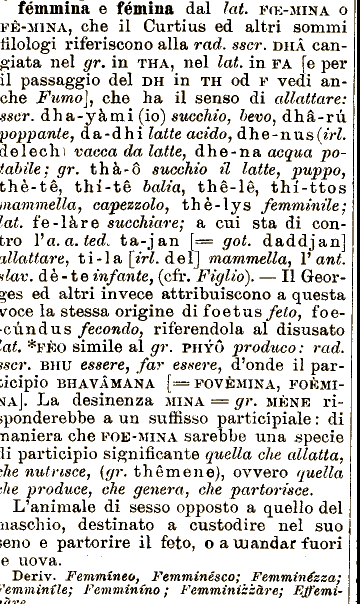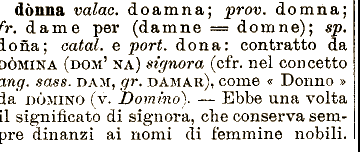child, girl, girl, girl, girl (little girl), a young woman, woman.
And female, then?
I take inspiration from a private conversation to try to explain briefly how and why when you use a word rather than another, when how and why one of the two terms, female, can be experienced (indeed, it is felt) as a insult. Let us help
as usual with the etymology.
Female \u0026lt;from Lat. foemina woman (the woman who is breast feeding, nurturing, which creates, who gives birth)
girl (meaning weak), female, female / female, femminiello \u0026lt;F ΠMINA
Donna \u0026lt;from Lat. dominates (Mrs.)
Madonna, maiden, lady and maid \u0026lt;DOMINA (I do not dwell on either Dante or the Dolce Stil Novo, nor on the Pre-Raphaelites)
The disparity between the ways that we want to give (or are just inside) to the words is obvious.
For this reason, in a time thankfully now far , the word was used female by men (fathers, brothers, husbands, boyfriends, cousins, sometimes even by women) to put in place, and bring diminishing ( rabaisser , fr.) a woman: 're just a girl.
As if the term female was a negative value, something passive.
As always, the movements that arise in the wake of a critical take on fully the word in question. I think the Decadent. I think Impressionism. And I also think the
Feminism. But talk about it outside of my will.
However, * female * and deliberately accepted and cited in such VOLUNTARILY contexts (and not always speak in general, h);
1. warm under the blankets and fresh between the sheets (who does understand, I mean)
2. wanting to exaggerate their femininity (female caliente are, for example)
3. as opposed to the word * male *
4. in the designation of the sex of a baby: is a female! , is a girl (remember the movie: We hope that both female) . And who better than
has, and so forth.
the symbol \u0026lt;means: * comes from * * *
derived from the symbol> means: * turns * * * gives





0 comments:
Post a Comment